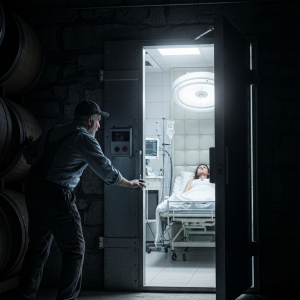The Christmas dinner was supposed to be a new beginning. Instead, it was an ending. My mother, her face contorted with a rage I had never seen before, tried to rip my engagement ring off my swollen finger. “You feminist witch,” she snarled, her voice a low, guttural sound. “You’ve destroyed everything I taught you.” When my fiancé, James, begged her to stop, she turned on him, screaming, “You destroyed my daughter! She was supposed to be pure!”
That was eight months ago. This morning, she was at my door, begging me to take back everything she did. To understand how we got here, you have to understand my mother. She is the most backward person I have ever met.
Ever since my sister, Elena, and I were little girls, my mother trained us to be perfect wives. This was not a suggestion; it was a rigorous, daily curriculum. We had to practice walking around the house balancing books on our heads while carrying trays of food. If we spilled a single drop, our punishment was to scrub the entire kitchen floor with a toothbrush. Our bedtime routine wasn’t stories; it was practicing sentences like, “Whatever you think is best, honey,” and “I’m sorry for speaking out of turn.” While I always felt a gross, crawling sensation on my skin while doing it, Elena was my mother’s star pupil, a little housewife in training.
By fifteen, Elena was ironing her boyfriend Dererick’s shirts every morning before school and packing his lunches with little love notes that said things like, “I exist to make you happy.” Instead of being concerned that her teenage daughter was acting like a 1950s servant, my mother was thrilled. She bought Elena a $300 KitchenAid mixer as a reward for her devotion.
Even though I hated my mother’s ideology, a part of me still desperately craved her validation. So, I poured everything I had into school. I excelled in extracurriculars, had a wide circle of friends, and was every teacher’s pet. When I finally got accepted into Northwestern’s prestigious business school, my mom was the first person I told. I handed her the letter, my hands trembling with pride. “Congratulations, honey,” was all she said, her voice flat, before tossing my acceptance letter into the trash. “But I really wish you would put this much effort into finding a nice boy to take care of you.”
The final breaking point of my childhood came a week later. I came home from school to find Elena on the couch, a dark, ugly bruise blooming under her eye, poorly covered with cheap concealer. When I tried to talk to her about it, she actually laughed, a high, brittle sound. “Oh, this?” she said, touching the bruise gingerly. “Dererick just gets a little carried away sometimes. It’s actually really sweet. It means he can’t control himself around me because he loves me so much.” In that moment, I knew I had lost her to our mother’s poison.
If that was what my mother wanted, then I figured I should at least try to make her happy, just once. That summer, I dated the worst guy I could find. Tyrone checked my phone, told me my friends were bad influences, and made me share my location 24/7. I knew it was wrong, a twisted parody of a relationship. But when I brought him home for the Fourth of July, my mother’s face lit up. She even hugged me for the first time in three years.
Four years later, I had graduated with a degree in finance. I had also spent months in therapy, untangling the knots of my upbringing. And I had found James. He was the oldest brother to three younger sisters, and he treated me like a queen. He actually listened when I talked. He made me laugh. He planned every date with a thoughtfulness I had never known. He was everything my mother despise in a man: a partner, not a master.
When Christmas came around, I was actually excited. I thought, maybe, just maybe, my family would see how genuinely happy I was. James kept reassuring me. “Things will be okay,” he’d said. “Your mom will love him.” For a second, I actually believed him.
When I knocked on the door, I had more confidence than I’d felt in years. But it was Elena who opened it, and she looked like a ghost of her former self. New bruises, poorly concealed. She walked with a slight limp she was trying to hide. My heart shattered for her. But as soon as she saw James take my coat, her face twisted into a familiar sneer. “Oh my gosh, Mia,” she gasped, loud enough for everyone to hear. “You’re emasculating him in public.”
James politely introduced himself and mentioned how proud he was of a recent promotion I had received. That’s when my mother’s fake smile vanished, replaced by a look of pure rage. “A real man doesn’t let his woman outshine him,” she hissed, grabbing my wrist so hard it left marks. That’s when she noticed my engagement ring. The diamond seemed to catch the light and ignite her fury.
“You feminist… witch,” she screamed, the word a vile epithet on her lips. “You’ve destroyed everything I taught you!” She began to literally try and rip the ring off my finger. Elena, her own pain forgotten in a moment of programmed loyalty, jumped up and grabbed my shoulders, holding me still while my mother pulled and twisted. My finger was turning a deep, sickening purple, the pain excruciating.
James, seeing what was happening, immediately pulled out his phone and called 911 while trying to pull them off me. But my mother, in her rage, was impossibly strong. She let go of my finger only to grab a kitchen knife from the counter block. She lunged at James. “You destroyed my daughter!” she shrieked, her eyes wild. “She was supposed to be pure!”
The rest was a blur of screaming and sirens. The police arrived quickly. By the time the paramedics had cut the ring from my deeply lacerated, dislocated finger, the adrenaline had worn off, replaced by a cold, hard fury. I was going to have a life with James. And I was going to make my family back off. For good.
I blocked every number—my mother, Elena, even distant relatives who might pass along messages. James helped me change all my passwords and set up new email accounts. The first week was too quiet. I threw myself into work, but the harassment started soon after. My boss, Macatherine, called me into her office. My mother had been calling, claiming I had stolen family heirlooms and was suffering from a mental health crisis. I showed Macatherine the police report from Christmas. She was supportive, but warned me that if the disruptions continued, it could affect my career.
My mother escalated faster than we could file paperwork. On a Saturday morning, we woke to the police pounding on our apartment door. My mother had called in a wellness check, claiming James was holding me hostage. We showed the tired-looking officers our documentation. They advised us to get a restraining order. But the damage with our neighbors was done. Whispers followed us in the hallway.
Then Elena started leaving drunken, slurring voicemails on James’s phone. “This is all your fault,” she’d cry. “Dererick left me! He said our family is too much drama! You ruined everything!”
The harassment charges were filed, but my mother only became more creative. She called other departments at my work, telling accounting I was embezzling, telling HR I was selling illegal substances. She called our biggest client and claimed I was stealing their data. The promotion I had worked three years for was put on hold, then taken off the table completely.
She found out about our wedding plans. A cousin who worked at city hall had leaked the date. We knew she would show up. The morning of our courthouse ceremony was gray and drizzly. James’s family were our only guests. Just as we were about to go before the judge, the doors burst open. My mother stormed in, wearing her best church dress, with Elena and a strange man in tow. “Stop this blasphemy!” she shrieked. “My daughter is not in her right mind!”
Security moved in, but she was fast, grabbing my arm. “Mia, baby, this man has poisoned your mind! This is Brandon. He’s willing to forgive you, to take you back to the right path!” The man, who looked like a softer version of Elena’s abusive ex, gave me a rehearsed smile. The scene was a circus. As security dragged my mother out, she screamed about feminist cults and how our marriage wasn’t legal. We got married anyway, the judge looking on with a mixture of pity and disbelief.
The war was just beginning. My mother filed for power of attorney, claiming I was mentally incompetent due to “feminist indoctrination.” She escalated her calls to my work, and I lost a two-million-dollar account for the company after she burst into a client meeting. That was the end of my job. She had a network of friends from her church who would show up at our apartment at all hours, claiming to be worried about me.
The turning point came at the preliminary hearing for our restraining order. Elena took the stand. The defense attorney tried to paint her as a victim of my “toxic influence.” But under cross-examination, she let something slip. Dererick had left her, she admitted, because our mother had called his workplace seventeen times, trying to tell his boss what a “good, submissive wife” Elena would be. They had fired him for the disruption. My mother hadn’t just destroyed my life; she had destroyed Elena’s too.
The restraining order was extended. The criminal charges proceeded. But my mother made one final, catastrophic mistake. I came home from a job interview to find our apartment door unlocked. The destruction inside was methodical. Every piece of professional clothing I owned was shredded, scattered across the bedroom like confetti. Tucked into each ruined garment was a small, handwritten card with a Bible verse about a woman’s submission. And written in lipstick on my bedroom mirror was a chilling message: ‘I brought you into this world. I can take you out of it.’
The security footage showed my mother using Elena’s spare key. The death threat, combined with breaking and entering, was the final nail in her coffin.
The trial was a formality. Elena testified against her. Macatherine testified about the lost clients and revenue. The jury found her guilty on all counts. She was sentenced to five years, with the possibility of parole after eighteen months.
Elena moved in with us temporarily while she got back on her feet. She started therapy, grappling with a lifetime of manipulation. “She trained us to be victims,” she told me one night. “And when you refused, she couldn’t handle it.”
My mother was released after eighteen months to a halfway house two states away. The restraining order is still in effect for ten years. The last I heard, she had joined a new church and was telling everyone about her two daughters who had been led astray by feminist demons. Let her tell her stories. She can’t hurt us anymore.
My career has recovered. A smaller firm, fully aware of the situation, hired me. It was a fresh start. James and I found a new apartment in a secure building. We built a fortress around our life, protecting the peace we had fought so hard to find. Elena got her own place, started community college, and began to build a life that was truly her own.
The calls and police visits stopped. The whispers faded. Life became… quiet. Normal. We had Sunday dinners with James’s family, a loud, loving, chaotic group that felt more like home than my own family ever had. His sisters, Ashley, Jenny, and Victoria, became the sisters I always wished for. They taught me that family wasn’t about control, but about unconditional support.
Elena and I began the slow, painful work of rebuilding something between us. It wasn’t a return to the past, but the creation of something new. We met for coffee in neutral places. We talked about our therapy sessions, sharing insights and frustrations. We learned to speak to each other without our mother’s voice echoing in our heads. “I don’t know who I am without her telling me who to be,” Elena confessed one afternoon. “I know,” I said. “That’s the point. You get to decide now.”
One day, about a year after the trial, I got a call from a number I didn’t recognize. It was Dererick, Elena’s abusive ex. He sounded different, hesitant. He said he had been in therapy himself and wanted to apologize to Elena, but knew he had no right to contact her directly. He asked if I would pass along a message. He said he finally understood that what he had done was abuse, not love, and that he was deeply sorry for the pain he had caused. I told Elena about the call. She listened, her face unreadable. “Tell him I got the message,” was all she said. She didn’t need his apology to heal, but hearing it seemed to close a painful chapter for her.
The peace was real, but the trauma lingered. A loud noise would make me jump. I’d sometimes wake up in a cold sweat, the image of my mother with the knife fresh in my mind. James was my anchor through it all, his calm strength a constant reassurance. We decided to renew our vows on our second anniversary, not in a courthouse, but on a beach at sunrise, with just his family and Elena as our witnesses. Elena was my maid of honor. She was still fragile, but she stood tall beside me, a testament to her own resilience. It wasn’t a reset; it was a reclamation.
The last I heard through a distant cousin who still sent occasional, unsolicited updates, my mother had become a prominent figure in her new church community in her new state. She told everyone there her tragic story: how her two beloved daughters had been led astray by a secular, feminist world, how she had tried desperately to “save” them, and how she had been persecuted and even imprisoned for her faith and her maternal concern. She was, in her new narrative, a martyr. Let her be a martyr. Let her tell her stories to anyone who would listen. Her voice couldn’t reach us anymore.
Life settled into a new, beautiful rhythm. My career, which I thought had been permanently derailed, slowly rebuilt itself. Macatherine, my old boss, became something of a mentor, and when I was ready, she gave me a glowing reference that helped me land a senior position at a smaller, more dynamic firm. They knew the whole story and valued my resilience.
James and I bought a house. It had a small garden, and we spent weekends planting flowers, our hands in the dirt. It felt grounding, like we were literally putting down roots. Elena, who was now studying to become a counselor for victims of domestic abuse, would come over for dinner. Our conversations were no longer about the past, but about the future—her classes, my work projects, our shared, simple joys.
We weren’t the family our mother had tried to create, two broken halves of her own twisted reflection. We were scarred, and we were healing. But we were finally, finally free. And in that freedom, we found something far more valuable than the “purity” she had been so desperate to preserve: we found ourselves.




